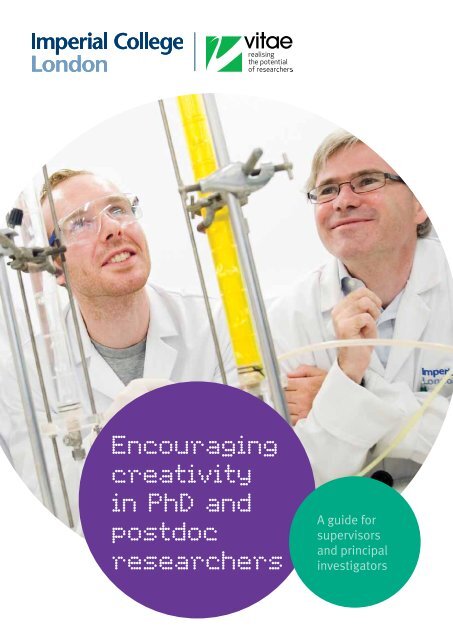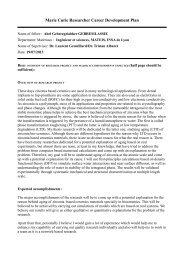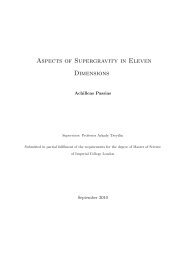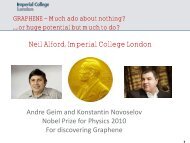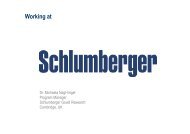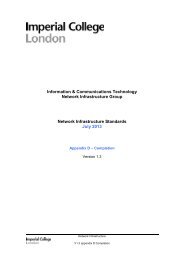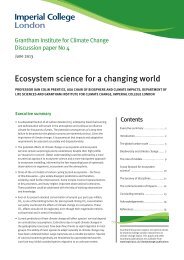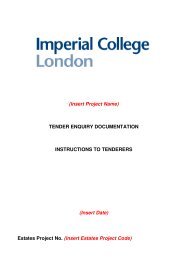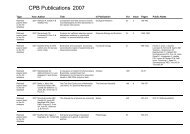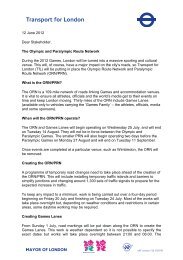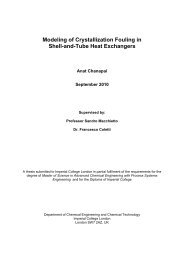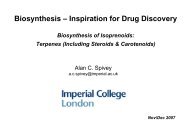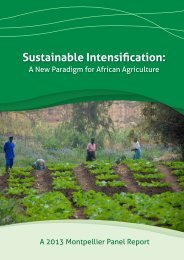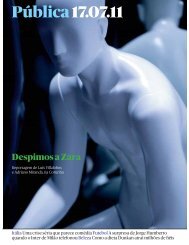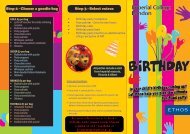Encouraging creativity in PhD and postdoc researchers - Workspace ...
Encouraging creativity in PhD and postdoc researchers - Workspace ...
Encouraging creativity in PhD and postdoc researchers - Workspace ...
Create successful ePaper yourself
Turn your PDF publications into a flip-book with our unique Google optimized e-Paper software.
<strong>Encourag<strong>in</strong>g</strong><br />
<strong>creativity</strong><br />
<strong>in</strong> <strong>PhD</strong> <strong>and</strong><br />
<strong>postdoc</strong><br />
<strong>researchers</strong><br />
A guide for<br />
supervisors<br />
<strong>and</strong> pr<strong>in</strong>cipal<br />
<strong>in</strong>vestigators
Funded by Vitae Innovate 2009<br />
Material from this document may be freely reproduced, <strong>in</strong> any medium, by<br />
UK higher education <strong>in</strong>stitutions only, strictly for their own non-commercial<br />
tra<strong>in</strong><strong>in</strong>g <strong>and</strong> development purposes, subject to acknowledgement of copyright.<br />
Materials may be adapted for your own non-commercial use provided that the<br />
orig<strong>in</strong>al source <strong>and</strong> copyright is acknowledged. If material is required for use<br />
outside the UK higher education sector, <strong>and</strong>/or for commercial use, please<br />
contact the Graduate School, Imperial College London.<br />
About Vitae<br />
Vitae is supported by Research Councils UK (RCUK) <strong>and</strong> managed by CRAC: The<br />
Careers Development Organisation. Vitae’s vision is for the UK to be world class<br />
<strong>in</strong> support<strong>in</strong>g the personal, professional <strong>and</strong> career development of <strong>researchers</strong>.<br />
To achieve our vision we have four aims:<br />
• Build<strong>in</strong>g human capital by <strong>in</strong>fluenc<strong>in</strong>g the development <strong>and</strong> implementation of<br />
effective policy relat<strong>in</strong>g to researcher development<br />
• Enhanc<strong>in</strong>g higher education provision to tra<strong>in</strong> <strong>and</strong> develop <strong>researchers</strong><br />
• Empower<strong>in</strong>g <strong>researchers</strong> to make an impact <strong>in</strong> their careers<br />
• Evidenc<strong>in</strong>g the impact of professional <strong>and</strong> career development support for<br />
<strong>researchers</strong><br />
Vitae’s work with higher education <strong>in</strong>stitutions<br />
Vitae works with UK higher education <strong>in</strong>stitutions (HEIs) to embed professional<br />
<strong>and</strong> career development <strong>in</strong> the research environment. Vitae plays a major<br />
role <strong>in</strong> <strong>in</strong>novat<strong>in</strong>g, shar<strong>in</strong>g practice <strong>and</strong> enhanc<strong>in</strong>g the capability of the higher<br />
education sector to provide world-class professional development <strong>and</strong> tra<strong>in</strong><strong>in</strong>g<br />
of <strong>researchers</strong>. We do this both through national projects <strong>and</strong> Hub activities.<br />
The programme develops resources for use by tra<strong>in</strong>ers <strong>and</strong> others work<strong>in</strong>g<br />
with <strong>researchers</strong>, <strong>and</strong> provides opportunities for HEIs to share <strong>in</strong>formation <strong>and</strong><br />
practice; develop ideas <strong>and</strong> approaches; <strong>and</strong> work collaboratively.<br />
This guide was written by Katie Anders (project researcher)<br />
<strong>and</strong> Ela<strong>in</strong>e Walsh (Graduate School)<br />
© Graduate School, Imperial College London<br />
3
Contents<br />
2 Introduction<br />
3 PART 0NE: Creativity<br />
3 What is <strong>creativity</strong>?<br />
3 What a creative researcher does<br />
4 Who is creative?<br />
4 Creativity <strong>and</strong> the research environment<br />
5 PART TWO: <strong>Encourag<strong>in</strong>g</strong> <strong>creativity</strong><br />
6 Pr<strong>in</strong>ciple one: Contribut<strong>in</strong>g to a positive research culture<br />
8 Pr<strong>in</strong>ciple two: Facilitat<strong>in</strong>g communication<br />
10 Pr<strong>in</strong>ciple three: Support<strong>in</strong>g creative endeavour<br />
13 Conclusion: Make the difference<br />
1
Introduction<br />
Develop<strong>in</strong>g <strong>creativity</strong> is an important<br />
aspect of the tra<strong>in</strong><strong>in</strong>g <strong>and</strong> progression<br />
of <strong>PhD</strong> students <strong>and</strong> <strong>postdoc</strong>s <strong>in</strong> the<br />
STEM discipl<strong>in</strong>es (science, technology,<br />
eng<strong>in</strong>eer<strong>in</strong>g <strong>and</strong> mathematics). This is<br />
because:<br />
• <strong>Encourag<strong>in</strong>g</strong> <strong>creativity</strong> can lead to unexpected <strong>and</strong><br />
excit<strong>in</strong>g research f<strong>in</strong>d<strong>in</strong>gs<br />
• Creativity underp<strong>in</strong>s the orig<strong>in</strong>al contribution that<br />
all <strong>PhD</strong> c<strong>and</strong>idates are required to make <strong>in</strong> their<br />
field<br />
• The ability to generate new ideas, processes <strong>and</strong><br />
products gives your <strong>postdoc</strong>s a competitive edge<br />
• Creativity enhances all of the other skills that<br />
<strong>researchers</strong> develop dur<strong>in</strong>g the early years of their<br />
career<br />
As a supervisor or pr<strong>in</strong>cipal <strong>in</strong>vestigator (PI), you<br />
are <strong>in</strong> a strong position to facilitate <strong>creativity</strong> <strong>in</strong> your<br />
research environment. However, there is very little<br />
<strong>in</strong>formation available to <strong>researchers</strong> about what<br />
<strong>creativity</strong> is <strong>and</strong> how to facilitate it. This is why the<br />
Graduate School at Imperial College London carried<br />
out this project look<strong>in</strong>g at how <strong>PhD</strong> <strong>and</strong> <strong>postdoc</strong><br />
<strong>researchers</strong> can develop <strong>and</strong> use <strong>creativity</strong> <strong>in</strong> their<br />
work, <strong>and</strong> how their supervisors <strong>and</strong> PIs can help<br />
facilitate this.<br />
The aim of this guide is to communicate the key<br />
f<strong>in</strong>d<strong>in</strong>gs of the project, <strong>and</strong> to provide you with up<br />
to date <strong>in</strong>formation, tools <strong>and</strong> techniques on how<br />
to help the <strong>researchers</strong> you supervise <strong>and</strong> manage<br />
to develop <strong>and</strong> use <strong>creativity</strong> <strong>in</strong> their research. Its<br />
f<strong>in</strong>d<strong>in</strong>gs are applicable across the full spectrum of<br />
STEM discipl<strong>in</strong>es.<br />
2
PART ONE<br />
Creativity<br />
What is <strong>creativity</strong>?<br />
People tend to associate<br />
<strong>creativity</strong> primarily with the arts,<br />
but it is also core to scientific<br />
<strong>and</strong> technological endeavour. So<br />
what is <strong>creativity</strong>?<br />
There is no s<strong>in</strong>gle, all-encompass<strong>in</strong>g<br />
def<strong>in</strong>ition. It’s understood <strong>and</strong> described<br />
differently, depend<strong>in</strong>g on the context <strong>in</strong><br />
which it’s be<strong>in</strong>g used. In the STEM research<br />
environment, <strong>creativity</strong> is usually def<strong>in</strong>ed as:<br />
• The development of ideas <strong>and</strong> products<br />
that are orig<strong>in</strong>al <strong>and</strong> useful<br />
• The exam<strong>in</strong>ation <strong>and</strong>/or comb<strong>in</strong>ation<br />
of exist<strong>in</strong>g facts, ideas <strong>and</strong> theories <strong>in</strong><br />
orig<strong>in</strong>al <strong>and</strong> useful ways<br />
STEM <strong>researchers</strong> use <strong>creativity</strong> to<br />
develop <strong>and</strong> explore new problems<br />
<strong>and</strong> re-exam<strong>in</strong>e, re-articulate or solve<br />
exist<strong>in</strong>g ones <strong>in</strong> novel ways.<br />
However, decid<strong>in</strong>g what is <strong>and</strong> isn’t creative<br />
is not at all straightforward <strong>in</strong> practice. Who<br />
chooses whether an idea is useful, or who it<br />
might be useful to? How can we know that<br />
an idea, <strong>in</strong>vention or discovery might not<br />
be useful <strong>in</strong> future? Creativity is a nebulous<br />
concept, <strong>and</strong> any def<strong>in</strong>ition (<strong>in</strong>clud<strong>in</strong>g ours)<br />
is best viewed as cont<strong>in</strong>gent.<br />
Despite be<strong>in</strong>g tricky to p<strong>in</strong> down, it’s often<br />
argued that ‘you know <strong>creativity</strong> when you<br />
see it.’ The box outl<strong>in</strong>es the behaviours<br />
demonstrated by creative <strong>researchers</strong>.<br />
» WHAT A CREATIVE RESEARCHER DOES:<br />
» Develops new ways of work<strong>in</strong>g; has novel ideas <strong>and</strong> realises their potential<br />
» Identifies new trends; creates new opportunities<br />
» Develops conv<strong>in</strong>c<strong>in</strong>g <strong>and</strong> persuasive arguments to defend research<br />
» Takes <strong>in</strong>tellectual risks; challenges the status quo<br />
Extract from the Researcher Development Framework.<br />
Further <strong>in</strong>formation can be found at:<br />
> www.vitae.ac.uk/rdf<br />
3
Who is creative?<br />
Until recently, <strong>creativity</strong> was<br />
seen as a rare talent which a<br />
person either possessed or they<br />
didn’t. Creative scientists were<br />
identified by their contributions,<br />
which were thought to be<br />
exceptionally novel <strong>and</strong><br />
significant, <strong>and</strong> people tried to<br />
discover the characteristics that<br />
set these creative scientists apart<br />
from other, less creative people.<br />
Today, it is widely understood that<br />
every researcher has the potential to<br />
develop <strong>and</strong> use <strong>creativity</strong>, although<br />
an <strong>in</strong>dividual’s skills, knowledge <strong>and</strong><br />
abilities will <strong>in</strong>fluence the ways <strong>in</strong> which<br />
<strong>creativity</strong> is expressed <strong>and</strong> the results<br />
of their creative endeavour will vary.<br />
In the world of science <strong>and</strong> technology,<br />
<strong>creativity</strong> is no longer simply a matter<br />
of <strong>in</strong>dividual geniuses mak<strong>in</strong>g paradigm<br />
shift<strong>in</strong>g discoveries. It also encompasses<br />
the types of <strong>creativity</strong> that can lead to<br />
everyday breakthroughs <strong>and</strong> recognises<br />
the enormous potential for <strong>creativity</strong> <strong>in</strong><br />
collaborative enterprise.<br />
Whilst ‘Eureka!’ moments still occur, it’s<br />
rarely an <strong>in</strong>dividual or a s<strong>in</strong>gle breakthrough<br />
that pioneers development. Our knowledge<br />
is more often enhanced by the <strong>in</strong>cremental<br />
progress that comes about through<br />
collectively reconfigur<strong>in</strong>g problems,<br />
doma<strong>in</strong>s <strong>and</strong> situations.<br />
Creativity <strong>and</strong><br />
the research<br />
environment<br />
As our underst<strong>and</strong><strong>in</strong>g of<br />
<strong>creativity</strong> develops, so does<br />
our appreciation that the<br />
physical, social <strong>and</strong> cognitive<br />
(or <strong>in</strong>tellectual) environments<br />
<strong>in</strong> which <strong>researchers</strong> work have<br />
a real impact on their <strong>creativity</strong>.<br />
Some of these environmental<br />
factors can stimulate <strong>creativity</strong>.<br />
Others can <strong>in</strong>hibit it.<br />
We found that research<br />
environments most conducive to<br />
<strong>creativity</strong> are characterised by:<br />
• A work<strong>in</strong>g culture that balances<br />
structure <strong>and</strong> support with<br />
freedom<br />
• Frequent <strong>and</strong> constructive<br />
communication between<br />
colleagues<br />
• Time, space <strong>and</strong><br />
encouragement to be creative<br />
Part two of this booklet outl<strong>in</strong>es three<br />
core pr<strong>in</strong>ciples – each based on one of<br />
the characteristics outl<strong>in</strong>ed above – for<br />
improv<strong>in</strong>g your research environment. The<br />
pr<strong>in</strong>ciples are outl<strong>in</strong>ed <strong>in</strong> turn, accompanied<br />
by practical guidance on how to effect<br />
positive change <strong>in</strong> that area.<br />
4
PART TWO<br />
<strong>Encourag<strong>in</strong>g</strong> <strong>creativity</strong><br />
As a supervisor <strong>and</strong>/or PI, you are <strong>in</strong> a uniquely<br />
<strong>in</strong>fluential position to improve your research<br />
environment <strong>and</strong> facilitate a more creative research<br />
culture for the <strong>PhD</strong> students <strong>and</strong> <strong>postdoc</strong>s you work<br />
with. Even small changes can make a big difference<br />
<strong>in</strong> help<strong>in</strong>g to enhance the personal <strong>and</strong> professional<br />
development of your staff <strong>and</strong> students. This, <strong>in</strong> turn, can<br />
lead to unforeseen <strong>and</strong> astonish<strong>in</strong>g research f<strong>in</strong>d<strong>in</strong>gs.<br />
“To be creative you’ve got to fail a lot. You’ve got to have stupid<br />
ideas that would never work <strong>and</strong> then you’ve got to figure out why.<br />
And that only happens <strong>in</strong> an environment where you feel confident<br />
<strong>and</strong> that it’s not go<strong>in</strong>g to be the end of the world if you cock up an<br />
experiment or suggest someth<strong>in</strong>g stupid <strong>in</strong> a group meet<strong>in</strong>g. And<br />
I’d say that’s it. It’s not even facilities; it’s not even money, because<br />
whatever circumstance you’re <strong>in</strong>, you can be creative, but only if you<br />
feel comfortable. And that’s what I’ve learned from this group – if<br />
you feel that you’re <strong>in</strong> an environment where you’re enjoy<strong>in</strong>g what<br />
you do <strong>and</strong> you can fail <strong>and</strong> it’s not go<strong>in</strong>g to be the end of the world,<br />
then you will learn <strong>and</strong> progress”.<br />
}<br />
Postdoc, Natural Sciences<br />
5
Pr<strong>in</strong>ciple one:<br />
Contribut<strong>in</strong>g to a positive research culture<br />
Research environments consist<br />
of the physical spaces where<br />
research takes place <strong>and</strong> the<br />
people who <strong>in</strong>habit these<br />
spaces. A research culture can<br />
be thought of as ‘how th<strong>in</strong>gs<br />
are usually done’ by the people<br />
<strong>in</strong> research environments. Our<br />
study suggests that for <strong>PhD</strong> <strong>and</strong><br />
<strong>postdoc</strong> <strong>researchers</strong> work<strong>in</strong>g<br />
<strong>in</strong> STEM discipl<strong>in</strong>es, <strong>creativity</strong><br />
is most likely to flourish <strong>in</strong><br />
academic cultures that balance<br />
support <strong>and</strong> freedom.<br />
What is a supportive research<br />
environment?<br />
IT’S STRUCTURED<br />
Do<strong>in</strong>g creative research <strong>in</strong>volves hav<strong>in</strong>g the time <strong>and</strong><br />
space to th<strong>in</strong>k of – <strong>and</strong> try out – new ideas. Whilst this<br />
requires a degree of autonomy, it is vitally important<br />
for <strong>PhD</strong> <strong>and</strong> <strong>postdoc</strong> <strong>researchers</strong> that this autonomy be<br />
developed with<strong>in</strong> a structured environment. Research<br />
cultures where project objectives, timetables <strong>and</strong><br />
deadl<strong>in</strong>es are clearly communicated <strong>and</strong> <strong>researchers</strong><br />
are effectively managed can be particularly productive<br />
environments for creative research.<br />
IT’S SAFE<br />
Do<strong>in</strong>g creative research requires the confidence to<br />
try th<strong>in</strong>gs out, take risks <strong>and</strong> make mistakes. It also<br />
requires the confidence to ask questions <strong>and</strong> voice<br />
ideas. This means work<strong>in</strong>g <strong>in</strong> a culture where ‘silly’<br />
questions are positively welcomed <strong>and</strong> nobody is<br />
afraid of be<strong>in</strong>g ridiculed for hav<strong>in</strong>g an imag<strong>in</strong>ative idea.<br />
Facilitat<strong>in</strong>g a ‘safe’ research environment can lead to<br />
tremendously creative <strong>and</strong> productive communication<br />
between colleagues – particularly <strong>in</strong> the form of group<br />
bra<strong>in</strong>storm<strong>in</strong>g or problem solv<strong>in</strong>g exercises.<br />
IT’S COMMUNICATIVE<br />
Communication is a shortcut to <strong>creativity</strong>, but it<br />
needn’t <strong>in</strong>volve formal collaboration. <strong>Encourag<strong>in</strong>g</strong><br />
<strong>PhD</strong> students <strong>and</strong> <strong>postdoc</strong>s to spend time<br />
chatt<strong>in</strong>g with their colleagues can help them to<br />
generate, explore, critique <strong>and</strong> ref<strong>in</strong>e new <strong>and</strong><br />
<strong>in</strong>novative ideas. Pr<strong>in</strong>ciple three explores the<br />
creative value of communication <strong>in</strong> more detail.<br />
What is a free research environment?<br />
IT FACILITATES AUTONOMY<br />
Mak<strong>in</strong>g the transition from undergrad to postgrad,<br />
<strong>and</strong> from postgrad to <strong>postdoc</strong> research <strong>in</strong>volves<br />
develop<strong>in</strong>g greater autonomy as a researcher. The pace<br />
at which a student or <strong>postdoc</strong> develops autonomy will<br />
depend on their <strong>in</strong>dividual skills <strong>and</strong> requirements, the<br />
degree of research experience that they have <strong>and</strong> the<br />
environment they are research<strong>in</strong>g <strong>in</strong>. A comfortable<br />
degree of autonomy gives students <strong>and</strong> <strong>postdoc</strong>s some<br />
responsibility for the research processes <strong>and</strong> decisions<br />
which <strong>in</strong>fluence their work, whilst provid<strong>in</strong>g access to<br />
constructive <strong>and</strong> supportive feedback, guidance <strong>and</strong><br />
advice when required.<br />
IT’S INFORMAL<br />
Work<strong>in</strong>g <strong>in</strong> a relaxed <strong>and</strong> <strong>in</strong>formal environment can<br />
really boost <strong>creativity</strong>. Informal work<strong>in</strong>g cultures<br />
prioritise quality (for example, achievement) over<br />
quantity (for example, number of hours worked).<br />
They also facilitate open <strong>and</strong> productive relations<br />
between departmental staff <strong>and</strong> the <strong>postdoc</strong>s<br />
<strong>and</strong> students work<strong>in</strong>g there. F<strong>in</strong>ally, they are<br />
democratic. So every member of the department is<br />
approachable, <strong>and</strong> everyone’s ideas are valued.<br />
6
{“My supervisor always says ‘there’s no stupid questions’.<br />
He def<strong>in</strong>itely creates a completely open environment for<br />
me to talk about anyth<strong>in</strong>g <strong>and</strong> be creative <strong>and</strong> at first it’s<br />
difficult because it’s your supervisor, so there’s only so<br />
many times you want to go all the way up to his office<br />
to say someth<strong>in</strong>g really stupid. But with time if you do<br />
push it <strong>and</strong> you’re will<strong>in</strong>g to be creative, obviously it<br />
becomes comfortable. You have to like decide <strong>in</strong> your m<strong>in</strong>d<br />
not to be worried or <strong>in</strong>secure about be<strong>in</strong>g creative. You<br />
really just need to open the floodgates <strong>and</strong> let yourself<br />
be creative. But it’s really hard to get to that stage”.<br />
<strong>PhD</strong> student, Natural Sciences<br />
IT ENCOURAGES INTELLECTUAL<br />
ADVENTUROUSNESS<br />
The amount of <strong>creativity</strong> a student<br />
or <strong>postdoc</strong> br<strong>in</strong>gs to their research<br />
will be <strong>in</strong>fluenced by the amount of<br />
support <strong>and</strong> encouragement they<br />
receive to pursue <strong>in</strong>terest<strong>in</strong>g leads,<br />
try th<strong>in</strong>gs out <strong>and</strong> test orig<strong>in</strong>al new<br />
ideas. In order to do these th<strong>in</strong>gs,<br />
they need to develop the confidence<br />
to take some calculated risks –<br />
when to pursue a new or <strong>in</strong>terest<strong>in</strong>g<br />
piece of data, how long to deviate<br />
from their orig<strong>in</strong>al timetable, what<br />
types of resources to <strong>in</strong>vest.<br />
It is also important that students<br />
<strong>and</strong> <strong>postdoc</strong>s learn to accept<br />
that sometimes they will make<br />
mistakes <strong>and</strong> sometimes they will<br />
fail. Work<strong>in</strong>g <strong>in</strong> an environment<br />
where they are actively encouraged<br />
to try th<strong>in</strong>gs out can help them<br />
develop the confidence they<br />
need to work creatively.<br />
Manag<strong>in</strong>g the support/<br />
freedom balance<br />
One of your greatest responsibilities<br />
as a supervisor <strong>and</strong> PI is to help<br />
your <strong>researchers</strong> to f<strong>in</strong>d <strong>and</strong> susta<strong>in</strong><br />
a balance of support <strong>and</strong> freedom<br />
– or structure <strong>and</strong> autonomy – that<br />
helps them maximise their personal<br />
<strong>and</strong> professional development. The<br />
balance of support <strong>and</strong> freedom<br />
that works best for a researcher<br />
will depend on their <strong>in</strong>dividual<br />
skills, attributes <strong>and</strong> needs <strong>and</strong> is<br />
likely to fluctuate as they develop<br />
confidence <strong>and</strong> <strong>in</strong>dependence<br />
WHAT YOU CAN DO<br />
» Invite <strong>researchers</strong> to take<br />
ownership of their professional<br />
development by actively<br />
negotiat<strong>in</strong>g their support/freedom<br />
balance with you. This can be<br />
discussed dur<strong>in</strong>g supervisions<br />
<strong>and</strong> appraisals, <strong>and</strong> should be<br />
revisited periodically.<br />
» Help facilitate a structured<br />
environment by provid<strong>in</strong>g clear<br />
project outl<strong>in</strong>es, objectives <strong>and</strong><br />
deadl<strong>in</strong>es to everyone <strong>in</strong>volved.<br />
» Actively facilitate a ‘no silly<br />
questions or comments’ policy<br />
that applies to all group members<br />
<strong>and</strong> all types of group <strong>in</strong>teraction –<br />
particularly meet<strong>in</strong>gs. Develop<strong>in</strong>g<br />
a research culture where everyone<br />
feels safe <strong>and</strong> confident to<br />
contribute their ideas will take<br />
time, but with cont<strong>in</strong>ued <strong>and</strong><br />
proactive encouragement, it can<br />
be achieved.<br />
» Encourage students <strong>and</strong> <strong>postdoc</strong>s<br />
to feel that they are part of a<br />
democratic work<strong>in</strong>g culture<br />
by consult<strong>in</strong>g <strong>and</strong> <strong>in</strong>clud<strong>in</strong>g<br />
<strong>researchers</strong> <strong>in</strong> decisions that affect<br />
their research when possible. This<br />
will help to facilitate feel<strong>in</strong>gs of<br />
ownership <strong>and</strong> <strong>in</strong>vestment.<br />
» Help engender an open work<strong>in</strong>g<br />
culture by develop<strong>in</strong>g a policy of<br />
approachability. Mak<strong>in</strong>g yourself<br />
available – as far as is practicable<br />
– to students <strong>and</strong> <strong>postdoc</strong>s, will<br />
help them to feel that they can<br />
discuss problems, issues <strong>and</strong><br />
ideas with you <strong>and</strong> other members<br />
of academic staff.<br />
» Facilitate an <strong>in</strong>formal work<strong>in</strong>g<br />
culture by prioritis<strong>in</strong>g quality over<br />
quantity. Let members of your<br />
research group know that hard<br />
work, commitment <strong>and</strong> results are<br />
more important than the hours<br />
that <strong>researchers</strong> keep or what<br />
(with<strong>in</strong> reason!) they choose to<br />
wear to work.<br />
» Help encourage <strong>researchers</strong>’<br />
<strong>in</strong>tellectual adventurousness by<br />
normalis<strong>in</strong>g their mistakes <strong>and</strong><br />
failures. Rem<strong>in</strong>d<strong>in</strong>g students <strong>and</strong><br />
<strong>postdoc</strong>s that mak<strong>in</strong>g mistakes<br />
<strong>and</strong> gett<strong>in</strong>g th<strong>in</strong>gs wrong are<br />
natural <strong>and</strong> expected aspects<br />
of STEM research which every<br />
researcher experiences.<br />
7
Pr<strong>in</strong>ciple two:<br />
Facilitat<strong>in</strong>g communication<br />
Two types of communication have been shown to be particularly useful<br />
<strong>in</strong> stimulat<strong>in</strong>g <strong>creativity</strong> amongst <strong>PhD</strong> <strong>and</strong> <strong>postdoc</strong> <strong>researchers</strong>: these<br />
are constructive <strong>in</strong>formal <strong>and</strong> constructive formal communication.<br />
Why it matters<br />
CONSTRUCTIVE INFORMAL<br />
COMMUNICATION<br />
This can take place when<br />
<strong>researchers</strong> chat with their<br />
colleagues at their workspace,<br />
over a coffee or at lunch. Informal<br />
conversations between colleagues<br />
become constructive – from a<br />
research po<strong>in</strong>t of view – when they<br />
offer the follow<strong>in</strong>g:<br />
» A chance to share cognitive<br />
resources – important <strong>in</strong>formation<br />
about what’s go<strong>in</strong>g on <strong>in</strong> the<br />
field – such as new journal<br />
articles or upcom<strong>in</strong>g conferences.<br />
<strong>Encourag<strong>in</strong>g</strong> <strong>researchers</strong> to share<br />
<strong>in</strong>formation can save time too.<br />
» An opportunity to build social<br />
<strong>and</strong> professional networks which<br />
can help <strong>researchers</strong>, <strong>and</strong> their<br />
research.<br />
» Time <strong>and</strong> space to generate,<br />
share, explore <strong>and</strong> critique<br />
new ideas. Bounc<strong>in</strong>g ideas<br />
between colleagues <strong>in</strong> <strong>in</strong>formal<br />
conversations also helps to clarify<br />
<strong>and</strong> ref<strong>in</strong>e ideas, so <strong>researchers</strong><br />
can enhance their capacity for<br />
th<strong>in</strong>k<strong>in</strong>g creatively <strong>and</strong> speed<br />
up their work<strong>in</strong>g processes<br />
simultaneously.<br />
CONSTRUCTIVE FORMAL<br />
COMMUNICATION<br />
Most research groups organise<br />
regular meet<strong>in</strong>gs. These meet<strong>in</strong>gs<br />
can take the form of progress<br />
report sessions, discussion groups<br />
or sem<strong>in</strong>ars, but all represent<br />
some form of structured, formal<br />
communication. But not all of these<br />
are constructive.<br />
The most creative types of formal<br />
communication are constructive.<br />
They are:<br />
» Open: they take place <strong>in</strong> an<br />
environment where everyone<br />
feels safe to share their ideas, ask<br />
questions, discuss problems <strong>and</strong><br />
elicit help <strong>and</strong> advice<br />
» Safe: they create a space where<br />
people are encouraged to feel<br />
that there are no silly questions or<br />
stupid comments, just ideas<br />
» Democratic: where knowledge<br />
is exchanged horizontally across<br />
all participants rather than<br />
be<strong>in</strong>g dispensed by senior group<br />
members<br />
» Supportive <strong>and</strong> encourag<strong>in</strong>g:<br />
where every member of the group<br />
can give <strong>and</strong> receive constructive<br />
critique without fear of rebuke or<br />
ridicule<br />
» Intellectually adventurous:<br />
where all group members are<br />
encouraged to th<strong>in</strong>k big<br />
What you can do<br />
CONSTRUCTIVE INFORMAL<br />
COMMUNICATION<br />
» Let <strong>researchers</strong> know it’s okay<br />
to chat. Many <strong>PhD</strong> students <strong>and</strong><br />
<strong>postdoc</strong>s th<strong>in</strong>k that conversations<br />
with colleagues <strong>in</strong> the lab or<br />
office, popp<strong>in</strong>g out for a coffee,<br />
or even tak<strong>in</strong>g lunch away from<br />
their desk might be frowned upon<br />
by their supervisor or PI as time<br />
wast<strong>in</strong>g. Make it clear that it is an<br />
important – <strong>and</strong> expected – part<br />
of their job.<br />
» Encourage researcher<br />
led <strong>in</strong>itiatives such as the<br />
establishment of weekly<br />
journal clubs, poster days or<br />
even departmental picnics.<br />
If <strong>researchers</strong> know that<br />
suggestions will be met with<br />
enthusiasm, they are more likely<br />
to take the <strong>in</strong>itiative.<br />
8
{“The problem sessions that we have –<br />
we have cakes <strong>and</strong> pastry <strong>and</strong> coffee<br />
<strong>and</strong> stuff <strong>and</strong> it’s just a really relaxed<br />
sort of attitude – we have a laugh if<br />
someone makes a mistake <strong>and</strong> it’s<br />
a very relaxed environment where<br />
you’re allowed to fail basically! Then<br />
that fosters your <strong>creativity</strong> because<br />
you don’t hold back <strong>and</strong> you start to<br />
just get better at it”.<br />
Postdoc, Natural Sciences<br />
Whilst<br />
CONSTRUCTIVE FORMAL<br />
COMMUNICATION<br />
» Group meet<strong>in</strong>gs: To facilitate<br />
meet<strong>in</strong>gs that are open, safe,<br />
democratic, supportive <strong>and</strong><br />
that encourage <strong>in</strong>tellectual<br />
adventurousness focus on these<br />
practical techniques:<br />
– No silly questions: Do<strong>in</strong>g<br />
creative research requires the<br />
confidence to ask questions<br />
<strong>and</strong> voice ideas. As experts<br />
<strong>in</strong> your field, it’s unlikely that<br />
any contribution is completely<br />
silly. More importantly, even<br />
if it doesn’t solve the problem<br />
on the table, it could be<br />
the catalyst for the idea or<br />
solution that does.<br />
– Rotate the chair: This helps<br />
establish the pr<strong>in</strong>ciple that<br />
everyone can contribute<br />
ideas on an equal foot<strong>in</strong>g,<br />
regardless of their position,<br />
<strong>and</strong> widens participation.<br />
– Arrange tea <strong>and</strong> biscuits<br />
(this too, can be rotated):<br />
Not all meet<strong>in</strong>gs are tea<br />
<strong>and</strong> cake appropriate. But a<br />
cup of tea <strong>and</strong> a biscuit can<br />
help create an environment<br />
where <strong>researchers</strong> feel more<br />
comfortable shar<strong>in</strong>g ideas <strong>and</strong><br />
discuss<strong>in</strong>g problems.<br />
»Departmental sem<strong>in</strong>ars or<br />
talks: These are an important<br />
opportunity for <strong>researchers</strong> to<br />
meet <strong>and</strong> exchange ideas with<br />
one another <strong>and</strong> with the experts<br />
<strong>in</strong> their discipl<strong>in</strong>e. Whilst you can<br />
delegate the adm<strong>in</strong>, students<br />
or <strong>postdoc</strong>s may not have the<br />
seniority to draw the key th<strong>in</strong>kers<br />
<strong>in</strong> their field. Tak<strong>in</strong>g ownership of<br />
the speaker list for an academic<br />
year will boost both the profile<br />
of the sem<strong>in</strong>ar series <strong>and</strong> the<br />
experience of those who attend.<br />
» External events: Encourage <strong>PhD</strong>s<br />
<strong>and</strong> <strong>postdoc</strong>s to attend relevant<br />
events tak<strong>in</strong>g place outside of<br />
their department. Attend<strong>in</strong>g <strong>and</strong>,<br />
where appropriate, present<strong>in</strong>g<br />
at sem<strong>in</strong>ars <strong>and</strong> conferences<br />
<strong>in</strong> other departments, faculties<br />
<strong>and</strong> universities can be <strong>in</strong>spir<strong>in</strong>g<br />
<strong>and</strong> useful, <strong>and</strong> can generate<br />
enthusiasm <strong>and</strong> ideas which are<br />
then fed back <strong>in</strong>to their research.<br />
chatt<strong>in</strong>g with<br />
colleagues might not<br />
appear productive, <strong>PhD</strong><br />
<strong>and</strong> <strong>postdoc</strong> <strong>researchers</strong><br />
report a real benefit from<br />
such exchanges, which<br />
enable them to cultivate<br />
<strong>in</strong>valuable resources.<br />
9
Pr<strong>in</strong>ciple three:<br />
Provid<strong>in</strong>g time, space <strong>and</strong> encouragement<br />
for <strong>creativity</strong><br />
Develop<strong>in</strong>g <strong>and</strong> us<strong>in</strong>g <strong>creativity</strong> <strong>in</strong> today’s results driven<br />
research environment isn’t straightforward. Pressure<br />
to w<strong>in</strong> fund<strong>in</strong>g, complete projects to deadl<strong>in</strong>e <strong>and</strong> on<br />
budget, then publish the results <strong>in</strong> high rank<strong>in</strong>g journals<br />
can leave little room for pursu<strong>in</strong>g <strong>in</strong>terest<strong>in</strong>g leads or<br />
try<strong>in</strong>g out new <strong>and</strong> excit<strong>in</strong>g ideas. But these th<strong>in</strong>gs are<br />
vital to the professional development of <strong>PhD</strong> <strong>and</strong> <strong>postdoc</strong><br />
<strong>researchers</strong>, <strong>and</strong> they require your support. They can also<br />
lead to excit<strong>in</strong>g <strong>and</strong> unanticipated f<strong>in</strong>d<strong>in</strong>gs.<br />
Why it matters<br />
TIME AND SPACE TO THINK<br />
» As creative ideas <strong>and</strong> solutions rarely<br />
occur as soon as a problem or issue<br />
has been identified, it’s important that<br />
<strong>PhD</strong> <strong>and</strong> <strong>postdoc</strong> <strong>researchers</strong> are given<br />
adequate time <strong>and</strong> space to th<strong>in</strong>k them<br />
over. This can mean be<strong>in</strong>g encouraged to<br />
spend some time focuss<strong>in</strong>g on a particular<br />
issue, or to let ideas <strong>and</strong> problems<br />
develop over time rather than be<strong>in</strong>g<br />
rushed. Th<strong>in</strong>k<strong>in</strong>g problems, issues <strong>and</strong><br />
questions over outside of the workspace<br />
can also be beneficial to <strong>PhD</strong> <strong>and</strong> <strong>postdoc</strong><br />
<strong>researchers</strong>’ <strong>creativity</strong>. Engag<strong>in</strong>g <strong>in</strong> a nonwork<br />
related activity or even ‘switch<strong>in</strong>g<br />
off’ from a problem altogether have both<br />
been reported to be conducive to the<br />
development of orig<strong>in</strong>al <strong>and</strong> imag<strong>in</strong>ative<br />
ideas <strong>and</strong> solutions.<br />
TIME AND SPACE TO LEARN BY TRIAL AND<br />
ERROR<br />
»Hav<strong>in</strong>g room to f<strong>in</strong>d out how th<strong>in</strong>gs<br />
work by experiment<strong>in</strong>g with them<br />
is also vital to the development of a<br />
researcher’s <strong>creativity</strong>. If some time <strong>and</strong><br />
space for ‘try<strong>in</strong>g th<strong>in</strong>gs out’ is factored<br />
<strong>in</strong>to a researcher’s schedule, it might be<br />
accepted as part of the learn<strong>in</strong>g process<br />
rather than perceived as time wast<strong>in</strong>g.<br />
»Learn<strong>in</strong>g by experimentation requires<br />
confidence as <strong>researchers</strong> will spend time<br />
experiment<strong>in</strong>g with ideas <strong>and</strong> solutions<br />
that won’t always generate the results<br />
they anticipate or hope for. If <strong>researchers</strong><br />
feel they are work<strong>in</strong>g <strong>in</strong> an environment<br />
where it’s ok to take calculated risks<br />
with time <strong>and</strong> resources <strong>and</strong> make some<br />
mistakes <strong>in</strong> the pursuit of new ideas <strong>and</strong><br />
solutions, they are more likely to develop<br />
the confidence <strong>and</strong> autonomy to try th<strong>in</strong>gs<br />
out. In addition, discover<strong>in</strong>g where an<br />
idea or experiment went wrong can be as<br />
<strong>in</strong>structive (particularly for <strong>PhD</strong> students)<br />
as gett<strong>in</strong>g it right.<br />
10
{“I really encourage my people<br />
to be <strong>in</strong>novative, to try <strong>and</strong><br />
come up with new ideas, to not<br />
feel restra<strong>in</strong>ed by the project<br />
brief; to, if they come across<br />
someth<strong>in</strong>g <strong>in</strong>terest<strong>in</strong>g, to go<br />
<strong>and</strong> follow it up”.<br />
Supervisor <strong>and</strong> PI, Eng<strong>in</strong>eer<strong>in</strong>g<br />
TIME AND SPACE TO PURSUE<br />
INTERESTING LEADS<br />
» Research<strong>in</strong>g creatively <strong>in</strong>volves<br />
be<strong>in</strong>g attentive to <strong>in</strong>terest<strong>in</strong>g <strong>and</strong><br />
unexpected f<strong>in</strong>d<strong>in</strong>gs which can<br />
emerge dur<strong>in</strong>g experimentation<br />
or data analysis. These might be<br />
overlooked by <strong>PhD</strong> <strong>and</strong> <strong>postdoc</strong><br />
<strong>researchers</strong>, particularly if they<br />
do not relate directly to the<br />
project they are work<strong>in</strong>g on.<br />
<strong>Encourag<strong>in</strong>g</strong> them to look out<br />
for <strong>in</strong>terest<strong>in</strong>g results <strong>and</strong> leads<br />
can help <strong>researchers</strong> to feel<br />
less constra<strong>in</strong>ed by their project<br />
brief. If they do come across<br />
someth<strong>in</strong>g they th<strong>in</strong>k might be<br />
worth pursu<strong>in</strong>g, ask them to raise<br />
it with you. You might sometimes<br />
decide that the potential<br />
rewards – exit<strong>in</strong>g <strong>and</strong> unexpected<br />
research f<strong>in</strong>d<strong>in</strong>gs – are worth the<br />
calculated risk of deviat<strong>in</strong>g from<br />
budget <strong>and</strong> deadl<strong>in</strong>e.<br />
What you can do<br />
As a supervisor <strong>and</strong>/or PI, you<br />
have a significant <strong>in</strong>fluence over<br />
the amount of time <strong>and</strong> space<br />
your students <strong>and</strong> <strong>postdoc</strong>s are<br />
able to dedicate to do<strong>in</strong>g creative<br />
research. If you are open to the<br />
pursuit of new f<strong>in</strong>d<strong>in</strong>gs <strong>and</strong> ideas,<br />
it’s likely that they will see this as<br />
a fundamental part of the research<br />
process <strong>and</strong> build this <strong>in</strong>to their<br />
research practices.<br />
»Encourage students <strong>and</strong><br />
<strong>postdoc</strong>s to make some time for<br />
th<strong>in</strong>k<strong>in</strong>g – <strong>in</strong>side <strong>and</strong> outside<br />
the workspace. Encourage them<br />
to feel there is time for this,<br />
<strong>and</strong> that it’s valuable work.<br />
»Encourage <strong>researchers</strong> –<br />
particularly students – to try<br />
th<strong>in</strong>gs out for themselves. As well<br />
as be<strong>in</strong>g an effective learn<strong>in</strong>g<br />
tool, experiment<strong>in</strong>g also helps<br />
students <strong>and</strong> <strong>postdoc</strong>s to build<br />
the confidence <strong>and</strong> develop<br />
the autonomy they will need to<br />
conduct <strong>in</strong>dependent research <strong>in</strong><br />
the future.<br />
»Normalise failure. Gett<strong>in</strong>g th<strong>in</strong>gs<br />
wrong, mak<strong>in</strong>g mistakes <strong>and</strong><br />
fail<strong>in</strong>g is an unavoidable aspect<br />
of creative research. Encourage<br />
students <strong>and</strong> <strong>postdoc</strong>s to view<br />
their mistakes <strong>and</strong> failures as a<br />
normal <strong>and</strong> unavoidable aspect<br />
of STEM research <strong>and</strong> a valuable<br />
learn<strong>in</strong>g opportunity, as opposed<br />
to a disaster.<br />
»Encourage students <strong>and</strong><br />
<strong>postdoc</strong>s to share the excit<strong>in</strong>g<br />
aspects of their research with<br />
you as well as the frustrat<strong>in</strong>g<br />
or problematic parts.<br />
»Ask your students <strong>and</strong> <strong>postdoc</strong>s<br />
to actively look for <strong>in</strong>terest<strong>in</strong>g new<br />
leads or f<strong>in</strong>d<strong>in</strong>gs as they research.<br />
If they do discover someth<strong>in</strong>g<br />
orig<strong>in</strong>al or excit<strong>in</strong>g, ask them to<br />
discuss it with you. Together you<br />
can explore the relative merits of<br />
further <strong>in</strong>vestigation <strong>and</strong> decide<br />
on a course of action.<br />
» Try to be as flexible as possible<br />
if you are approached with a<br />
proposal to pursue an <strong>in</strong>terest<strong>in</strong>g<br />
f<strong>in</strong>d<strong>in</strong>g. Is there scope to deviate<br />
from the time table for a set<br />
period of time? If not, might there<br />
be an opportunity for students<br />
or <strong>postdoc</strong>s to pursue this<br />
thread later on? Alternatively,<br />
might they be able to conduct an<br />
<strong>in</strong>vestigation <strong>in</strong> their own time?<br />
» Try, wherever possible, to<br />
build a degree of flexibility<br />
<strong>in</strong>to the research grants that<br />
you oversee. Although this is<br />
far from straightforward, it is<br />
necessary to enable the pursuit<br />
of <strong>in</strong>terest<strong>in</strong>g f<strong>in</strong>d<strong>in</strong>gs that<br />
may arise dur<strong>in</strong>g a project.<br />
11
Conclusion<br />
Make the difference<br />
It is important to recognise<br />
the power that supervisors<br />
<strong>and</strong> PIs have <strong>and</strong> that<br />
small changes <strong>in</strong> the<br />
research environment<br />
can make a big difference<br />
to results. <strong>PhD</strong> students<br />
<strong>and</strong> <strong>postdoc</strong>s may have<br />
good ideas for how th<strong>in</strong>gs<br />
could work better, but<br />
without encouragement<br />
from you, they may<br />
never share them.<br />
Every academic department, lab <strong>and</strong><br />
research centre constitutes a unique<br />
research environment, with its own<br />
<strong>in</strong>dividual culture. Some aspects of this<br />
research culture will help <strong>researchers</strong> to<br />
work creatively. Others will make it more<br />
difficult. A <strong>PhD</strong> or <strong>postdoc</strong>’s experience<br />
of their research environment will also be<br />
<strong>in</strong>fluenced by the qualities <strong>and</strong> abilities that<br />
they, themselves, br<strong>in</strong>g to the environment.<br />
These are likely to change over time, as they<br />
learn new skills <strong>and</strong> techniques, grow <strong>in</strong><br />
confidence, adopt more responsibility <strong>and</strong><br />
atta<strong>in</strong> greater <strong>in</strong>dependence.<br />
Because of this, there is no algorithm for<br />
facilitat<strong>in</strong>g <strong>and</strong> manag<strong>in</strong>g consistently<br />
creative research projects. Mak<strong>in</strong>g space<br />
for <strong>creativity</strong> is itself a creative task,<br />
one that is often achieved by strik<strong>in</strong>g a<br />
balance – sometimes known as a creative<br />
tension – between too little of a given factor<br />
<strong>and</strong> too much. As we have suggested,<br />
the freedom to pursue ideas needs to be<br />
balanced by the structure of reasonable <strong>and</strong><br />
clearly communicated project targets <strong>and</strong><br />
deadl<strong>in</strong>es. Similarly, hav<strong>in</strong>g unlimited time<br />
<strong>and</strong> space to try out new ideas would soon<br />
become as unproductive as work<strong>in</strong>g with<br />
<strong>in</strong>sufficient resources.<br />
Nevertheless, it is worthwhile us<strong>in</strong>g your<br />
<strong>in</strong>fluence to ensure you maximise the flow<br />
<strong>and</strong> m<strong>in</strong>imise the blocks of <strong>creativity</strong> <strong>in</strong><br />
your team. A positive environment helps<br />
everyone to be more productive,<br />
realis<strong>in</strong>g benefits for <strong>in</strong>dividuals<br />
<strong>and</strong> the whole team. In carry<strong>in</strong>g<br />
out the research for this<br />
publication, time <strong>and</strong><br />
aga<strong>in</strong> we observed that<br />
people who worked <strong>in</strong><br />
creative environments<br />
were more likely to be<br />
motivated, enjoy their<br />
work, be <strong>in</strong>vested<br />
<strong>in</strong> it, get on with<br />
their colleagues<br />
<strong>and</strong> feel good about<br />
their results than<br />
those who didn’t.<br />
Use your <strong>in</strong>fluence to<br />
make the difference.<br />
13
Other good practice guides are available <strong>in</strong> this series:<br />
Do<strong>in</strong>g creative research<br />
A good practice guide for postgraduate <strong>researchers</strong> <strong>in</strong> STEM discipl<strong>in</strong>es<br />
Do<strong>in</strong>g creative research<br />
A good practice guide for <strong>postdoc</strong>s <strong>in</strong> STEM discipl<strong>in</strong>es<br />
These resources may also be downloaded from:<br />
www.vitae.ac.uk/database-of-resources<br />
1<br />
www.imperial.ac.uk/graduateschool


